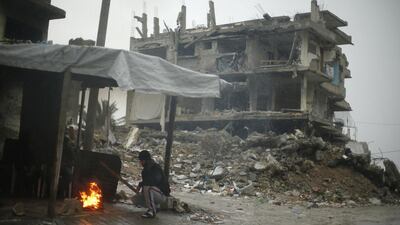American secretary of state John Kerry may have allowed himself a wry smile last Thursday when he flew into Amman for emergency talks with Israel’s prime minister Benjamin Netanyahu, Palestinian Authority president Mahmoud Abbas, and Jordan’s King Abdullah. The meeting was a panicked attempt to head off new violence in Jerusalem, and it signalled that the Israeli government, which has frequently disparaged Mr Kerry’s diplomatic efforts, was now seeking his help to manage a crisis of its own making.
Following the failure of Mr Kerry’s efforts to restart negotiations over a two-state solution last spring, Mr Netanyahu has backed away even from paying lip service to the idea. Not only is his government steadily expanding illegal settlements in the occupied territories, he has become increasingly frank about his rejection of Palestinian statehood.
“I think the Israeli people understand now what I always say,” Mr Netanyahu said in Jerusalem in July, four days into his bombing campaign in Gaza, “that there cannot be a situation, under any agreement, in which we relinquish security control of the territory west of the River Jordan.”
Mr Netanyahu has taken the mounting turmoil in the region over the past three years as an opportunity to make clear what he has previously signalled only with nods and winks to his right-wing base: that he has no intention of allowing a sovereign Palestinian state in the West Bank and East Jerusalem.
Mr Kerry warned in an April speech to a conference of Jewish-American leaders that Israel risked becoming an apartheidstate if it failed to conclude a two-state peace agreement, and would face the same international isolation that was directed at South Africa in the 1980s. He also warned that a resurgence of violence against Israelis was inevitable if Palestinians remained subject to the occupation status quo in perpetuity.
The predictable firestorm of criticism from Washington's pro-Israel establishment prompted Mr Kerry to withdraw his remarks, but events of recent months have vindicated his warnings. Israel is more isolated than it has been in more than a generation. European governments, belatedly recognising that the US-led "peace process" won't end the occupation, have begun to apply sanctions to products from Israel's West Bank settlements. They've also begun recognising Palestinian statehood, despite Israel's frantic objections. Israel withdrew its ambassador from Sweden last month after that country recognised a state of Palestine, while the parliaments of Britain and Ireland passed non-binding resolutions doing the same. Much of Latin America has already followed this path, and Spain and France are expected to do so soon.
The international community is signalling that Israel will no longer be allowed a veto over the achievement of Palestinian national sovereignty.
The diplomatic isolation compounds a growing political crisis for Mr Netanyahu. Hamas struck a powerful psychological blow last summer when it not only survived Israel’s relentless pummelling of Gaza, but its rockets briefly closed down Israel’s key connection to the world – Ben Gurion International Airport in Tel Aviv. The consensus in Israel was that the Gaza operation achieved no significant gains, but the damage for Mr Netanyahu came not only in diplomacy. It also shattered his promise to Israeli voters that he could deliver normality and tranquillity even while maintaining the occupation status quo.
Even after calm returned to Gaza, Jerusalem continued to simmer. There, the issue is the steady encroachment of Israeli settlements in the eastern part of the city, which Israel claims to have annexed after the war of June 1967 but where its claim of sovereignty is not internationally recognised – not even by the United States. Although the status of Jerusalem is designated a “final status” issue for peace talks, Israel insists it has no intention of sharing the city and has moved to cement its control through expanding settlements and building a light-rail system through the occupied parts of the city.
Small-scale incidents of violence and protest against Israeli encroachment have continued throughout the summer and autumn, but reached boiling point when the focus turned to the Al Aqsa Mosque, atop what Israelis call the Temple Mount. Right-wing Israeli groups with designs on rebuilding the ancient Jewish Temple on the site of Al Aqsa have been pressing Mr Netanyahu’s government for greater access to the site. And that has not only triggered responses across the West Bank and in Palestinian towns inside Israel, but also forced Jordan and the largely passive figure of Mahmoud Abbas to draw a red line.
But the latest Palestinian acts of protest and violence are not the work of Fatah or Hamas; they appear to be the relatively spontaneous expression of a generation of Palestinians who would have been preschoolers when the last intifada began. They came of age under a Palestinian Authority that had become part of the status quo, and have little reason to believe that Mr Abbas is going to end the occupation using the same negotiation-only strategy he has pursued in vain for 20 years.
Even if the Amman huddle resulted in the Israelis adopting a less provocative approach to policing the holy sites, it offered no solution to the wider crisis.
Mr Kerry made that much clear, saying the time was not right for renewed negotiations. Translation: Mr Netanyahu won’t offer the minimum any Palestinian leader would accept, while Mr Abbas’s political authority has declined because he offers Palestinians no prospect of ending the occupation.
The effectiveness of Mr Kerry’s efforts remain to be seen. But as he warned in his “apartheid” comment in April, there’s not much the US can do to shield Israel from the consequences of the path it has chosen.
Tony Karon teaches in the graduate programme at the New School in New York

